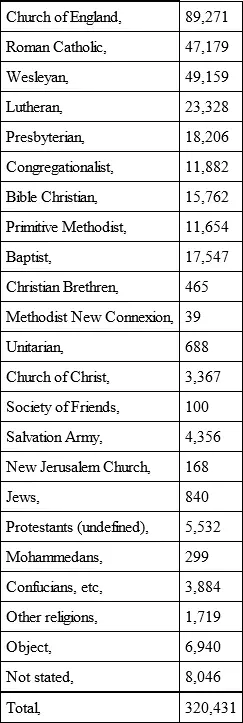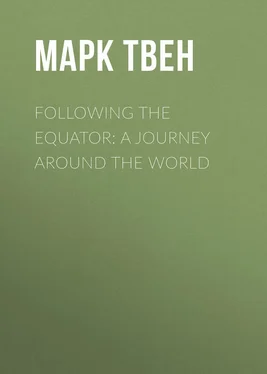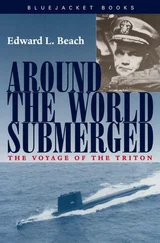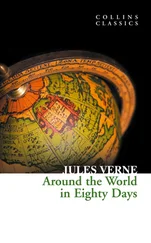Марк Твен - Following the Equator - A Journey Around the World
Здесь есть возможность читать онлайн «Марк Твен - Following the Equator - A Journey Around the World» — ознакомительный отрывок электронной книги совершенно бесплатно, а после прочтения отрывка купить полную версию. В некоторых случаях можно слушать аудио, скачать через торрент в формате fb2 и присутствует краткое содержание. Жанр: foreign_antique, foreign_prose, Путешествия и география, на английском языке. Описание произведения, (предисловие) а так же отзывы посетителей доступны на портале библиотеки ЛибКат.
- Название:Following the Equator: A Journey Around the World
- Автор:
- Жанр:
- Год:неизвестен
- ISBN:нет данных
- Рейтинг книги:4 / 5. Голосов: 1
-
Избранное:Добавить в избранное
- Отзывы:
-
Ваша оценка:
- 80
- 1
- 2
- 3
- 4
- 5
Following the Equator: A Journey Around the World: краткое содержание, описание и аннотация
Предлагаем к чтению аннотацию, описание, краткое содержание или предисловие (зависит от того, что написал сам автор книги «Following the Equator: A Journey Around the World»). Если вы не нашли необходимую информацию о книге — напишите в комментариях, мы постараемся отыскать её.
Following the Equator: A Journey Around the World — читать онлайн ознакомительный отрывок
Ниже представлен текст книги, разбитый по страницам. Система сохранения места последней прочитанной страницы, позволяет с удобством читать онлайн бесплатно книгу «Following the Equator: A Journey Around the World», без необходимости каждый раз заново искать на чём Вы остановились. Поставьте закладку, и сможете в любой момент перейти на страницу, на которой закончили чтение.
Интервал:
Закладка:
“With him? Oh, it did. It’s not so sad a case. He is modest, and he left out some of the particulars. The lad reached South Australia just in time to help discover the Burra-Burra copper mines. They turned out L700,000 in the first three years. Up to now they have yielded L20,000,000. He has had his share. Before that boy had been in the country two years he could have gone home and bought a village; he could go now and buy a city, I think. No, there is nothing very pathetic about his case. He and his copper arrived at just a handy time to save South Australia. It had got mashed pretty flat under the collapse of a land boom a while before.” There it is again; picturesque history – Australia’s specialty. In 1829 South Australia hadn’t a white man in it. In 1836 the British Parliament erected it – still a solitude – into a Province, and gave it a governor and other governmental machinery. Speculators took hold, now, and inaugurated a vast land scheme, and invited immigration, encouraging it with lurid promises of sudden wealth. It was well worked in London; and bishops, statesmen, and all sorts of people made a rush for the land company’s shares. Immigrants soon began to pour into the region of Adelaide and select town lots and farms in the sand and the mangrove swamps by the sea. The crowds continued to come, prices of land rose high, then higher and still higher, everybody was prosperous and happy, the boom swelled into gigantic proportions. A village of sheet iron huts and clapboard sheds sprang up in the sand, and in these wigwams fashion made display; richly-dressed ladies played on costly pianos, London swells in evening dress and patent-leather boots were abundant, and this fine society drank champagne, and in other ways conducted itself in this capital of humble sheds as it had been accustomed to do in the aristocratic quarters of the metropolis of the world. The provincial government put up expensive buildings for its own use, and a palace with gardens for the use of its governor. The governor had a guard, and maintained a court. Roads, wharves, and hospitals were built. All this on credit, on paper, on wind, on inflated and fictitious values – on the boom’s moonshine, in fact. This went on handsomely during four or five years. Then all of a sudden came a smash. Bills for a huge amount drawn by the governor upon the Treasury were dishonored, the land company’s credit went up in smoke, a panic followed, values fell with a rush, the frightened immigrants seized their gripsacks and fled to other lands, leaving behind them a good imitation of a solitude, where lately had been a buzzing and populous hive of men.
Adelaide was indeed almost empty; its population had fallen to 3,000. During two years or more the death-trance continued. Prospect of revival there was none; hope of it ceased. Then, as suddenly as the paralysis had come, came the resurrection from it. Those astonishingly rich copper mines were discovered, and the corpse got up and danced.
The wool production began to grow; grain-raising followed – followed so vigorously, too, that four or five years after the copper discovery, this little colony, which had had to import its breadstuffs formerly, and pay hard prices for them – once $50 a barrel for flour – had become an exporter of grain.
The prosperities continued. After many years Providence, desiring to show especial regard for New South Wales and exhibit loving interest in its welfare which should certify to all nations the recognition of that colony’s conspicuous righteousness and distinguished well-deserving, conferred upon it that treasury of inconceivable riches, Broken Hill; and South Australia went over the border and took it, giving thanks.
Among our passengers was an American with a unique vocation. Unique is a strong word, but I use it justifiably if I did not misconceive what the American told me; for I understood him to say that in the world there was not another man engaged in the business which he was following. He was buying the kangaroo-skin crop; buying all of it, both the Australian crop and the Tasmanian; and buying it for an American house in New York. The prices were not high, as there was no competition, but the year’s aggregate of skins would cost him L30,000. I had had the idea that the kangaroo was about extinct in Tasmania and well thinned out on the continent. In America the skins are tanned and made into shoes. After the tanning, the leather takes a new name – which I have forgotten – I only remember that the new name does not indicate that the kangaroo furnishes the leather. There was a German competition for a while, some years ago, but that has ceased. The Germans failed to arrive at the secret of tanning the skins successfully, and they withdrew from the business. Now then, I suppose that I have seen a man whose occupation is really entitled to bear that high epithet – unique. And I suppose that there is not another occupation in the world that is restricted to the hands of a sole person. I can think of no instance of it. There is more than one Pope, there is more than one Emperor, there is even more than one living god, walking upon the earth and worshiped in all sincerity by large populations of men. I have seen and talked with two of these Beings myself in India, and I have the autograph of one of them. It can come good, by and by, I reckon, if I attach it to a “permit.”
Approaching Adelaide we dismounted from the train, as the French say, and were driven in an open carriage over the hills and along their slopes to the city. It was an excursion of an hour or two, and the charm of it could not be overstated, I think. The road wound around gaps and gorges, and offered all varieties of scenery and prospect – mountains, crags, country homes, gardens, forests – color, color, color everywhere, and the air fine and fresh, the skies blue, and not a shred of cloud to mar the downpour of the brilliant sunshine. And finally the mountain gateway opened, and the immense plain lay spread out below and stretching away into dim distances on every hand, soft and delicate and dainty and beautiful. On its near edge reposed the city.
We descended and entered. There was nothing to remind one of the humble capital, of huts and sheds of the long-vanished day of the land-boom. No, this was a modern city, with wide streets, compactly built; with fine homes everywhere, embowered in foliage and flowers, and with imposing masses of public buildings nobly grouped and architecturally beautiful.
There was prosperity, in the air; for another boom was on. Providence, desiring to show especial regard for the neighboring colony on the west called Western Australia – and exhibit loving interest in its welfare which should certify to all nations the recognition of that colony’s conspicuous righteousness and distinguished well-deserving, had recently conferred upon it that majestic treasury of golden riches, Coolgardie; and now South Australia had gone around the corner and taken it, giving thanks. Everything comes to him who is patient and good, and waits.
But South Australia deserves much, for apparently she is a hospitable home for every alien who chooses to come; and for his religion, too. She has a population, as per the latest census, of only 320,000-odd, and yet her varieties of religion indicate the presence within her borders of samples of people from pretty nearly every part of the globe you can think of. Tabulated, these varieties of religion make a remarkable show. One would have to go far to find its match. I copy here this cosmopolitan curiosity, and it comes from the published census:

The item in the above list “Other religions” includes the following as returned:
Читать дальшеИнтервал:
Закладка:
Похожие книги на «Following the Equator: A Journey Around the World»
Представляем Вашему вниманию похожие книги на «Following the Equator: A Journey Around the World» списком для выбора. Мы отобрали схожую по названию и смыслу литературу в надежде предоставить читателям больше вариантов отыскать новые, интересные, ещё непрочитанные произведения.
Обсуждение, отзывы о книге «Following the Equator: A Journey Around the World» и просто собственные мнения читателей. Оставьте ваши комментарии, напишите, что Вы думаете о произведении, его смысле или главных героях. Укажите что конкретно понравилось, а что нет, и почему Вы так считаете.












